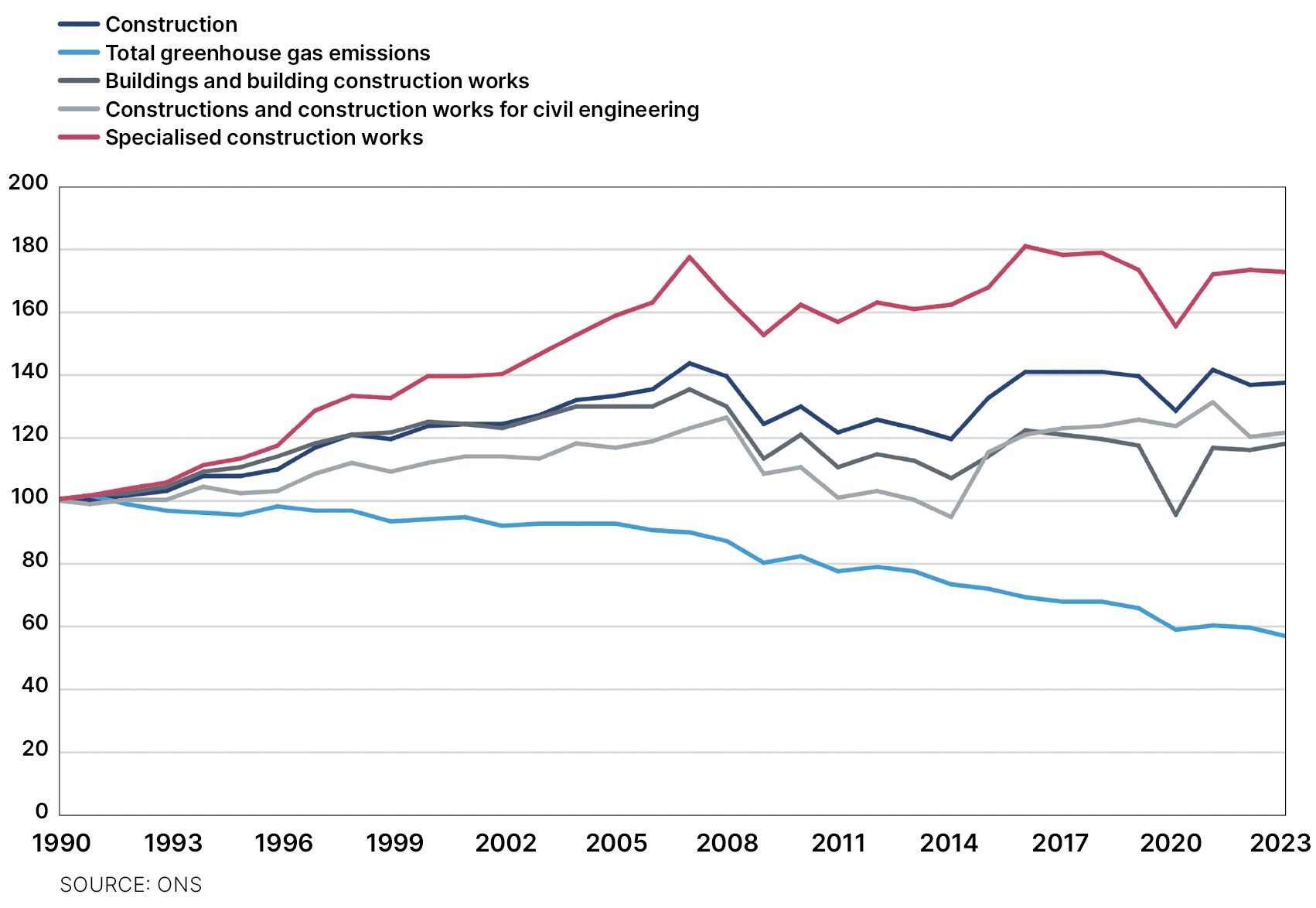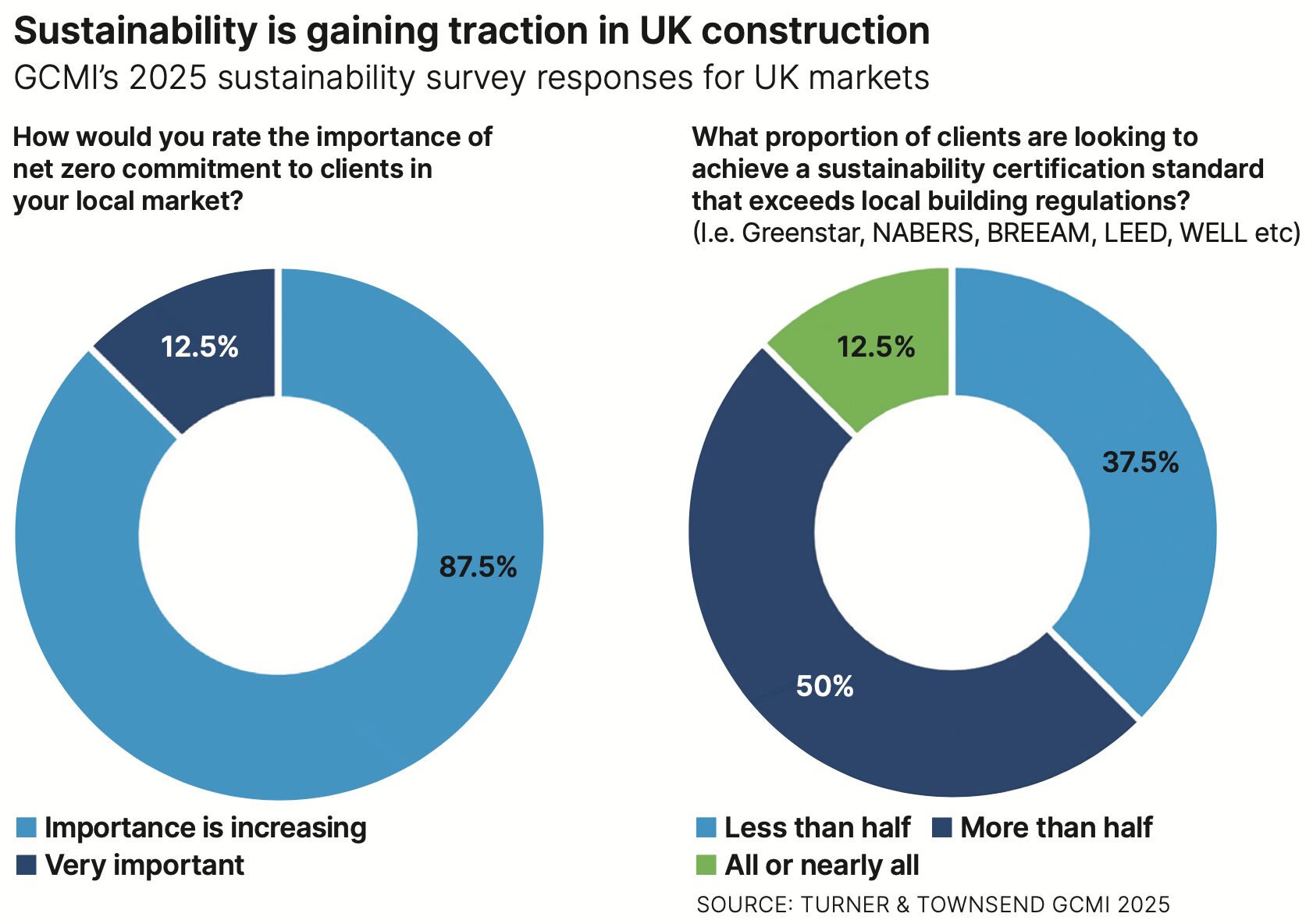
Construction professionals committed to sustainability must adopt performance benchmarks and set science-based targets, argues Barrett Harris.
The UK construction sector has a pivotal role to play in achieving the nation’s net-zero target by 2050. However, a comparison of national and construction-specific greenhouse gas emissions reveals a stark contrast. Between 1990 and 2023, the UK reduced its overall emissions by 43%. In contrast, emissions from the construction sector rose by 37.2%.
Specialist construction activities have been the primary contributors, with emissions increasing by nearly 72%. These activities include pile-driving, foundation works, concrete work and demolition, all of which generate significant greenhouse gases. For example, demolition contributes through vehicle and machinery emissions, while landfill disposal of waste produces methane.
These figures highlight a critical truth: the industry must shift its mindset from short-term cost concerns to long-term, value-driven sustainability goals.
Turner & Townsend’s latest Global Construction Market Intelligence (GCMI) report confirms that change is underway. Seven of the eight UK markets included in the study now report that net-zero commitments are of “increasing importance” to clients. In London, this sentiment is especially pronounced, with respondents rating it as “very important”.
Breakdown of construction emissions in the UK since 1990

In recent years, momentum has grown. The Construction Leadership Council’s CO2nstruct Zero programme provides a strategic framework for decarbonisation, while the UK Green Building Council’s Net Zero Carbon Buildings Framework offers clarity on performance benchmarks.
Major developers, contractors and infrastructure bodies are responding, with many now setting science-based targets or committing to whole-life carbon reporting. To help achieve these targets at best value, Turner & Townsend is embedding carbon as the second currency of construction, alongside cost.
Using our Embodied Carbon Calculator, we are helping clients make smarter, more sustainable decisions from day one. However, gaps still persist between making high-level commitments and their delivery on live projects.
Aiming for BREEAM
One of the key enablers in bridging this gap is by having a project achieve a sustainability certification standard, such as BREEAM (Building Research Establishment Environmental Assessment Method).
As the UK’s leading sustainability assessment method for buildings, BREEAM offers a robust, evidence-based framework for embedding sustainable design and operational practices across all project stages. With over 300,000 BREEAM-certified developments in the UK, it has become a recognisable benchmark for environmental performance.

Moreover, clients are increasingly aligning BREEAM certification with broader environmental, social and governance (ESG) strategies. Green certified assets are shown to attract higher rental premiums and deliver better long-term value through reduced operational costs and lower regulatory risk.
In the public sector, BREEAM is often a planning condition or funding requirement, reinforcing its role as a delivery mechanism for net zero objectives.
Our GCMI data shows strong momentum in Turner & Townsend’s regional markets, where clients are increasingly aiming for BREEAM or equivalent certification. However, these regions still need to catch up with London’s leading position if the 2050 net-zero target is to be met.
Collaboration across clients, design teams, contractors and supply chains will be essential, alongside continued innovation in low-carbon materials, modular methods and digital optimisation tools.
Achieving net zero by 2050 is an immense challenge. BREEAM may not be a silver bullet, but it offers a trusted benchmark for measuring what matters, managing carbon risk and demonstrating environmental performance with credibility.
For every construction professional committed to leading the net-zero transition, achieving certification such as BREEAM is no longer optional: it‘s fundamental.
Barrett Harris is a senior economic analyst at Turner & Townsend.











